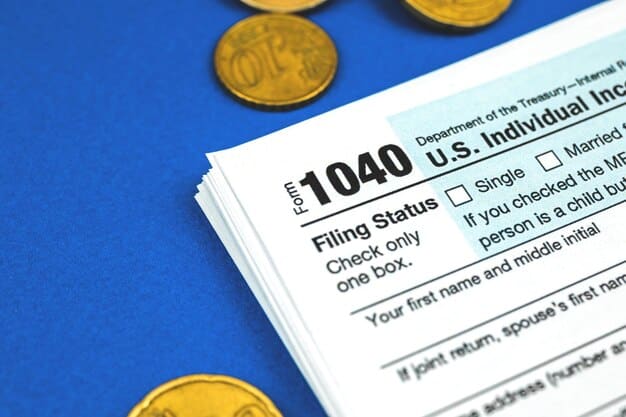New Crypto Tax Rules for 2025: What You Need to Know

Anúncios
The impending new regulations on cryptocurrency taxation affect your 2025 tax filings by introducing more stringent reporting requirements, clarity on asset classification, and potentially revised capital gains treatments, necessitating proactive adjustments from all crypto holders in the United States.
Anúncios
As the digital asset landscape continues its rapid evolution, so too does the regulatory scrutiny surrounding it. For cryptocurrency holders in the US, understanding how new regulations on cryptocurrency taxation affect your 2025 tax filings is not merely an academic exercise, but a pressing financial imperative. These incoming changes promise to reshape how gains, losses, and transactions involving digital assets are reported to the Internal Revenue Service (IRS), demanding a proactive approach to financial planning.
Understanding the Shifting Regulatory Landscape
The world of cryptocurrency has long operated in a grey area concerning taxation, leading to confusion and, at times, non-compliance among investors. However, as the market matures and digital assets garner mainstream attention, governments worldwide, including the United States, are stepping up their efforts to define and regulate this space. The new regulations aim to provide much-needed clarity, but also impose stricter obligations on taxpayers.
Anúncios
The primary drivers behind these changes are clear: ensuring fair tax collection, preventing illicit activities, and consumer protection. For years, the IRS has struggled to keep pace with the innovative nature of crypto, often issuing guidance retrospectively. The upcoming rules for 2025 filings represent a more comprehensive attempt to integrate digital assets firmly into the existing tax framework. This involves identifying taxable events, clarifying the tax treatment of various crypto activities, and, crucially, enhancing reporting mechanisms.
Key Regulatory Bodies and Their Influence
Several governmental bodies play a pivotal role in shaping cryptocurrency tax policies. The **Internal Revenue Service (IRS)** is, of course, at the forefront, responsible for enforcing tax laws. Their guidance often comes in the form of notices, FAQs, and, increasingly, published regulations. The **Treasury Department** often partners with the IRS to develop these rules, translating broader policy goals into actionable tax requirements. Then there’s the **Financial Crimes Enforcement Network (FinCEN)**, focused on anti-money laundering (AML) and combating the financing of terrorism (CFT), whose directives often influence reporting requirements related to exchanges and custodians.
- The IRS sets the specific rules for how crypto transactions are reported and taxed.
- The Treasury Department assists in crafting the broader policy framework behind crypto taxation.
- FinCEN’s AML/CFT efforts influence reporting obligations for financial intermediaries.
Understanding the mandates and collaborative efforts of these entities is critical because their combined actions are what dictate the tax obligations you will face. Disregard for their guidance can lead to significant penalties, underscoring the importance of staying informed and compliant.
Ultimately, this evolving landscape means that casual participation in the crypto market is becoming increasingly difficult without encountering tax implications. The age of ambiguity is slowly giving way to an era of defined responsibilities, placing the onus on taxpayers to accurately track and report their digital asset activities.
Defining Taxable Cryptocurrency Events
Before delving into the details of the new regulations, it’s essential to grasp what constitutes a taxable event in the cryptocurrency world. Unlike traditional fiat currency, which is taxed primarily when earned as income, most cryptocurrency transactions are treated as dispositions of property for tax purposes in the US. This means that every time you sell, exchange, or even dispose of crypto in certain ways, you might trigger a taxable event.
The core principle is that if you realize a gain from your crypto assets, it’s generally subject to capital gains tax. If you incur a loss, it could be deductible. The challenge lies in accurately tracking the cost basis of your various crypto holdings and determining the fair market value at the time of each transaction. This level of detail is often overlooked by new investors, leading to complications during tax season.
Common Taxable Events to Watch For
Navigating cryptocurrency taxation requires a keen eye for activities that trigger tax obligations. While selling crypto for fiat is an obvious taxable event, many other less apparent transactions also fall under IRS scrutiny. Understanding these can help prevent unwelcome surprises.
- **Selling cryptocurrency for fiat currency:** The classic taxable event, where you convert your digital assets into traditional money.
- **Exchanging one cryptocurrency for another:** Even if no fiat currency is involved, swapping Bitcoin for Ethereum is considered a disposition of property.
- **Using cryptocurrency to purchase goods or services:** Treating crypto as a medium of exchange for purchases triggers a capital gain or loss.
- **Receiving cryptocurrency as income, wages, or for services rendered:** This is taxed as ordinary income at its fair market value at the time of receipt.
Beyond these common scenarios, activities like **mining, staking, lending, and yield farming** also have distinct tax implications. For instance, cryptocurrency earned through mining or staking is generally considered ordinary income at the time of receipt, valued at its fair market value. When those earned assets are later sold or exchanged, they then become subject to capital gains rules based on their cost basis.

The complexity arises from the sheer volume and variety of transactions that many active crypto users engage in. Each transaction needs to be meticulously recorded, along with the date, fair market value, and cost basis. This granular tracking is what the new regulations aim to mandate more effectively, pushing for greater transparency and compliance across the board.
Therefore, it’s not enough to simply know if you owe taxes; you must also understand precisely when those obligations arise. Proactive record-keeping is your best defense against potential issues and penalties.
New Reporting Requirements for Brokers and Exchanges
One of the most significant changes expected to impact 2025 tax filings involves the expanded reporting requirements for cryptocurrency brokers and exchanges. Under the proposed regulations, these entities will be largely treated like traditional financial institutions, obligated to issue tax forms to their users and report transaction data directly to the IRS. This shift represents a monumental step towards closing the information gap that has long existed in crypto taxation.
Previously, individuals were largely responsible for self-reporting all crypto transactions, often without standardized forms or clear guidance from exchanges. This new framework aims to streamline the reporting process for the IRS, making it easier for the agency to cross-reference reported income and transactions with what individuals declare on their tax returns. Essentially, the IRS will have a much clearer picture of your crypto activities, reducing opportunities for non-compliance.
Form 1099-DA: The New Standard
A central piece of this new reporting puzzle is the introduction of a new form: **Form 1099-DA, *Broker and Digital Asset Transaction Reporting***. This form is designed to provide detailed information about your digital asset sales and exchanges, similar to how Form 1099-B reports stock transactions. The information reported will include the gross proceeds from sales, the cost basis of the assets sold, and whether the gain or loss was short-term or long-term.
- **Gross Proceeds:** The total amount received from the sale of digital assets.
- **Cost Basis:** The original value of the asset used to calculate gain or loss.
- **Acquisition Date:** The date you acquired the digital asset.
- **Date of Sale/Exchange:** The date of the transaction.
This mandate on brokers extends beyond traditional centralized exchanges to many other entities facilitating digital asset transactions, including certain payment processors and even some hosted wallet providers. The broad definition of “broker” ensures comprehensive coverage, leaving fewer opaque channels for crypto activity.

For taxpayers, this means that come 2025, you can expect to receive a Form 1099-DA from the crypto platforms you use, detailing your covered transactions. While this simplifies tax preparation by providing pre-filled information, it also places a greater emphasis on ensuring the accuracy of the data reported by these platforms. Taxpayers will still be responsible for reviewing these forms and addressing any discrepancies with the issuing broker before filing.
Failure to provide accurate information to your crypto broker could lead to incorrect Form 1099-DA reporting, which in turn could trigger further inquiries from the IRS. It underscores the importance of verifying your personal information and transaction history with your providers.
Impact on Different Crypto Activities
The new regulations are not a one-size-fits-all approach; their impact will vary significantly depending on the types of cryptocurrency activities you engage in. While the broad strokes of capital gains taxation remain, clarifications and new definitions will specifically affect decentralized finance (DeFi), NFTs, and even small, everyday crypto transactions. This nuanced approach reflects the growing complexity of the digital asset ecosystem and the IRS’s efforts to categorize income and gains accurately within it.
For instance, activities traditionally difficult for the IRS to track, such as obscure DeFi protocols or peer-to-peer transactions, will likely see increased scrutiny. The goal is to ensure that all forms of economic activity involving digital assets contribute their fair share to the tax base, closing what the government perceives as loopholes.
Decentralized Finance (DeFi) and NFTs
The world of **Decentralized Finance (DeFi)** presents unique tax challenges due to its open, permissionless nature. Activities like lending, borrowing, yield farming, and liquidity providing often involve multiple complex transactions. The new regulations aim to clarify the tax treatment of rewards earned from staking and yield farming (generally income when received), and the capital gains/losses from the underlying asset movements within DeFi protocols. Tracing the cost basis and calculating gains/losses across these interactive protocols will require meticulous record-keeping, as automated reporting from DeFi protocols themselves is not yet widespread.
- **Staking Rewards:** Taxed as ordinary income at Fair Market Value (FMV) when received.
- **Yield Farming Proceeds:** Similar to staking, often taxed as ordinary income.
- **Liquidity Pool Gains/Losses:** Subject to capital gains/losses upon removal of liquidity.
Similarly, **Non-Fungible Tokens (NFTs)** have burst onto the scene, creating new categories for digital asset taxation. NFTs are generally considered collectibles by the IRS, which come with a higher capital gains tax rate (up to 28%) for long-term gains compared to other capital assets. The new rules might provide more specific guidance on the valuation of NFTs, especially for those exchanged or gifted. The “broker” definition could also expand to include platforms facilitating NFT sales, necessitating broader 1099-DA reporting.
Even seemingly minor transactions, like using crypto for a cup of coffee, will still technically trigger a capital gain or loss. While the IRS previously focused on larger transactions, stricter reporting requirements mean that even small disparities could become more noticeable. This encourages users to consider the tax implications of every single digital asset movement rather than just large trading activities.
The intent behind these specific clarifications is to ensure that emerging as well as established crypto activities are brought under the purview of tax law. This requires both adaptability from taxpayers and sophistication in tax software solutions to handle the myriad of transactions.
Navigating Capital Gains and Losses
At the heart of cryptocurrency taxation lies the concept of capital gains and losses. For most individuals, buying and selling crypto is treated similarly to trading stocks or bonds. When you sell or exchange a digital asset for more than its cost basis, you realize a capital gain. If you sell it for less, you incur a capital loss. The new regulations solidify and potentially refine how these are calculated and reported, emphasizing accuracy and transparency.
The distinction between short-term and long-term capital gains is crucial. Assets held for one year or less before disposition result in short-term capital gains, taxed at your ordinary income tax rates. Assets held for more than a year produce long-term capital gains, typically taxed at lower, preferential rates. Accurately tracking your holding periods for each specific unit of cryptocurrency becomes paramount, especially if you engage in frequent trading.
Strategies for Optimizing Tax Outcomes
With the new regulations on the horizon, proactive tax planning becomes more vital than ever. While the core tax principles remain, understanding how to apply them strategically can significantly impact your tax liability.
- **Tax-Loss Harvesting:** This is a common strategy where you sell underperforming assets at a loss to offset capital gains and, potentially, up to $3,000 of ordinary income. With enhanced reporting, this strategy becomes more transparent to the IRS, making accurate calculations essential.
- **First-In, First-Out (FIFO) vs. Specific Identification:** The IRS allows different methods for calculating cost basis. FIFO assumes the first crypto you acquired is the first sold. Specific identification allows you to choose which specific units of crypto (e.g., the ones with the highest cost basis) you are selling, which can be advantageous for reducing capital gains. New reporting requirements might make specific identification easier to implement and verify.
- **Long-Term Holding:** Whenever possible, holding assets for more than a year to qualify for lower long-term capital gains tax rates remains a powerful strategy. The new clarity in reporting holding periods will reinforce the importance of this timing.
It’s important to remember that these strategies require diligent record-keeping. Every purchase, sale, exchange, and transfer must be meticulously documented, including the date, value, and precise amount of crypto involved. In the absence of comprehensive 1099-DA forms from all your platforms – particularly for earlier transactions or self-custodied assets – this responsibility falls squarely on the individual taxpayer.
The ability to accurately track your cost basis and holding periods will be the bedrock of effective crypto tax planning under the new rules. Leveraging tax software and professional advice can become indispensable tools for many investors.
Record-Keeping Best Practices for 2025
Given the upcoming changes in cryptocurrency taxation, rigorous record-keeping is no longer optional; it is an absolute necessity. The IRS has consistently stated that taxpayers are responsible for maintaining accurate records for all their cryptocurrency transactions. With the introduction of Form 1099-DA and increased data sharing, the need for personal accountability in record-keeping only intensifies, as your records will be critical for reconciling with broker-provided statements and for any audit inquiries.
Effective record-keeping means documenting every single interaction you have with your digital assets, from acquisition to disposition. This includes not just trading, but also receiving crypto as income, mining, staking, gifting, or even using it for everyday purchases. The more comprehensive your records, the smoother your tax preparation process will be, and the better prepared you will be to address any discrepancies.
Essential Data Points to Track
To meet the demands of the new regulations and ensure accurate tax filings, several key data points should be meticulously tracked for every cryptocurrency transaction. This applies whether you are using a centralized exchange, a decentralized platform, or holding assets in a self-custodied wallet.
- **Date and Time of Transaction:** Precise timestamps are crucial, especially for determining short-term vs. long-term gains.
- **Type of Transaction:** Clearly identify if it was a purchase, sale, exchange, gift, receipt of income, etc.
- **Fair Market Value (FMV):** The value of the cryptocurrency in USD at the exact moment of the transaction.
- **Cost Basis:** The original purchase price, including any fees, of the crypto you are disposing of.
- **Quantity of Cryptocurrency:** The exact number of units transacted.
- **Wallet Addresses/Transaction IDs:** For on-chain transparency and verification, if applicable.
- **Platform/Exchange Used:** The name of the service where the transaction occurred.
- **Purpose of Transaction:** (e.g., “purchased goods,” “traded for ETH,” “received as staking reward”).
For more complex activities like DeFi yield farming or NFT minting, additional details such as gas fees, initial liquidity provided, and specific protocol interactions might also need to be recorded. While tax software can automate much of this, it relies on accurate input and integration with your various crypto accounts. Therefore, regularly exporting transaction histories from your exchanges and wallets, and consolidating them into a single record-keeping system, is a highly recommended practice.
Ultimately, a robust record-keeping system acts as your primary defense against potential IRS inquiries and ensures that you are only paying the taxes you legally owe, rather than overpaying due to insufficient documentation.
Leveraging Tax Software and Professional Advice
Given the increasing complexity of cryptocurrency taxation and the introduction of new regulations for 2025, relying solely on manual calculations or basic spreadsheets may no longer be sufficient for many investors. The sheer volume of transactions, coupled with varying cost basis methods and the need to reconcile with new 1099-DA forms, makes specialized tools and expert guidance invaluable. Leveraging tax software and professional advice can significantly streamline the tax preparation process and help ensure compliance.
The goal is not just to file your taxes, but to file them accurately and efficiently, minimizing your tax burden within the bounds of the law, and reducing the risk of IRS audits or penalties. These resources are designed to handle the nuances of crypto taxation that traditional tax preparation methods might miss.
Choosing the Right Tools and Advisors
Selecting appropriate cryptocurrency tax software is a critical first step for many. These platforms specialize in integrating with various exchanges, wallets, and blockchain explorers to import your transaction history, calculate cost basis, identify taxable events, and generate the necessary tax forms. Look for software that offers:
- **Broad Exchange/Wallet Integrations:** The more platforms it connects to, the less manual data entry you’ll need.
- **Accurate Cost Basis Accounting:** Support for various methods (FIFO, LIFO, specific identification).
- **Comprehensive Tax Form Generation:** Ability to generate IRS Form 8949, Schedule D, and support for the new 1099-DA reconciliation.
- **User-Friendly Interface:** An intuitive design that simplifies the complex process.
- **Dedicated Customer Support:** For when you inevitably encounter integration issues or have tax-specific questions.
While software can automate calculations, complex situations, multiple DeFi interactions, or significant trading volumes might warrant consulting with a **crypto tax professional**. These individuals specialize in digital asset taxation and can provide personalized advice on:
- **Complex Tax Scenarios:** Navigating unique situations like token airdrops, hard forks, obscure DeFi protocols, or large-scale NFT transactions.
- **Audit Defense:** Representing you in the event of an IRS inquiry or audit.
- **Proactive Tax Planning:** Developing strategies for tax-loss harvesting, retirement planning with crypto, or optimal structuring of crypto-related businesses.
- **Staying Abreast of Changes:** Professionals are typically up-to-date on the latest IRS guidance and regulatory shifts.
Even if you use tax software, having a professional review your output or advise on specific strategies provides an extra layer of assurance. The investment in robust tools and expert advice can often outweigh the potential costs of incorrect filings or missed opportunities for tax optimization.
Therefore, don’t underestimate the value of these resources. They represent an essential part of a comprehensive strategy for navigating the complexities of cryptocurrency taxation in 2025 and beyond.
Preparing for Your 2025 Tax Filings
With the new regulations on cryptocurrency taxation set to significantly impact your 2025 tax filings, early preparation is not just a recommendation—it’s a prudent financial strategy. Procrastination in this area can lead to a rushed, error-prone filing process, potentially resulting in penalties or missed opportunities for tax savings. The time to get your crypto financial house in order is now, long before tax season officially begins.
This preparation involves not only understanding the new rules but also actively gathering and organizing your data. The goal is to arrive at tax season with a clear, audited record of your crypto activities, minimizing stress and maximizing accuracy. Remember that the IRS operates with a long memory; past transactions, even those pre-dating new regulations, can still come under scrutiny if related to current holdings or activities.
Actionable Steps to Take Now
To ensure a smooth and compliant 2025 tax filing, consider implementing the following actionable steps well in advance:
- **Consolidate All Transaction Data:** Gather transaction histories from every exchange, wallet, and platform you’ve used since your first crypto activity. This includes centralized exchanges, DeFi protocols (if possible), and individual wallet transfers.
- **Reconcile and Verify Data:** If using tax software, import all your data and review its calculations. Cross-reference with your own records. Identify and correct any discrepancies, especially concerning cost basis and fair market value.
- **Understand the New Forms:** Familiarize yourself with the expected Form 1099-DA and how it will interact with your existing tax forms, such as Form 8949 (Sales and Other Dispositions of Capital Assets) and Schedule D (Capital Gains and Losses).
- **Stay Informed:** Keep an eye on official IRS publications, guidance, and news from reputable crypto tax experts. The regulatory landscape can still evolve, even as 2025 approaches.
- **Consult a Professional (If Needed):** If your crypto activities are complex or you simply prefer expert assistance, schedule a consultation with a crypto tax accountant or advisor well before the filing deadline.
- **Address Past Non-Compliance:** If you have prior unfiled crypto taxes, consider exploring voluntary disclosure programs or seeking professional advice on how to become compliant, as the IRS’s enforcement capabilities are growing.
Being proactive about these steps can transform what might otherwise be a daunting task into a manageable process. The objective is to have a clear, auditable trail of your crypto activities that aligns seamlessly with both your personal records and the information reported by brokers. This level of preparation provides peace of mind and significantly reduces the risk of future complications with the IRS.
Ultimately, navigating the new regulations successfully hinges on diligent preparation, continuous learning, and, for many, the strategic use of specialized tools and expert guidance to ensure full compliance.
| Key Point | Brief Description |
|---|---|
| 📈 New Broker Reporting | Crypto exchanges will issue Form 1099-DA, detailing sales and cost basis. |
| 🔄 Taxable Event Clarity | More explicit guidance on taxing swaps, staking, mining, and NFT transactions. |
| 📚 Enhanced Record-Keeping | Crucial to track all transaction details, especially cost basis and FMV. |
| 💡 Proactive Tax Planning | Utilize software and professional advice to optimize capital gains/losses. |
Frequently Asked Questions About Crypto Tax Regulations
Form 1099-DA is a new IRS form that crypto brokers and exchanges will use to report your digital asset sales to you and the IRS. It will detail gross proceeds, cost basis, and gain/loss, simplifying your tax preparation but also increasing IRS visibility into your crypto transactions.
Yes, NFTs are generally treated as collectibles for tax purposes and are subject to capital gains rules. New regulations might provide more specific guidance on their valuation and expand broker reporting to platforms facilitating NFT sales, impacting your 2025 filings.
Staking rewards are generally considered ordinary income at their fair market value when received. The new regulations aim to solidify this treatment and ensure consistent reporting. Any subsequent sale of staked assets would then be subject to capital gains tax.
You need to meticulously record every crypto transaction, including date, type, fair market value, and cost basis. This detailed record-keeping is crucial for reconciling with new 1099-DA forms and for supporting your tax claims during any potential IRS inquiry.
Absolutely. Crypto tax software is designed to integrate with exchanges, track transactions, calculate gains/losses, and generate necessary tax forms like 8949. It’s a valuable tool to navigate the increased complexity and reporting requirements of the new regulations efficiently.
Conclusion
The impending new regulations on cryptocurrency taxation represent a significant shift in how digital assets are integrated into the established financial system. For your 2025 tax filings, this means heightened scrutiny, clearer definitions of taxable events, and, crucially, a shift towards more standardized reporting via Form 1099-DA from brokers and exchanges. While the core principles of capital gains and income taxation remain, the increased transparency necessitates meticulous record-keeping and proactive engagement from every crypto holder. Understanding these changes, preparing diligently, and leveraging available tools and professional advice will be paramount to ensuring compliance, minimizing tax liabilities, and navigating the evolving landscape of digital asset taxation with confidence.





